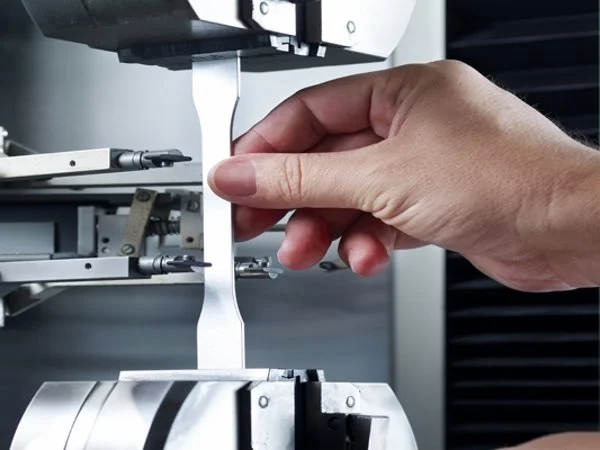JIS B7721 Hardness Testing of Metals
In the oil and gas sector, ensuring the integrity and durability of materials used in equipment is paramount. The JIS B7721 hardness test serves as a critical tool for assessing the mechanical properties of metallic components, which are essential for maintaining operational safety and efficiency.
The Japanese Industrial Standard (JIS) B7721 specifies the Rockwell Hardness HRC scale for testing hardened steel and other high-hardness materials. This method is widely used in the oil and gas industry to evaluate the hardness of various components, including valves, pipes, and fittings that undergo severe mechanical stress.
The test involves applying a specific load to the sample using a diamond indenter or ball indenter, depending on the material type. The depth of penetration by the indenter is measured, which is then converted into a hardness value according to the JIS B7721 standard. This process helps in determining whether materials meet the required standards for use in oil and gas applications.
For instance, valves made from high-carbon steel need to withstand high pressure and temperature variations without compromising their structural integrity. By using JIS B7721 hardness testing, manufacturers can ensure that these components are robust enough to perform under harsh conditions without failure.
The test results provide valuable insights into the material's suitability for specific applications within the oil and gas industry. For example, a valve with insufficient hardness might fail at high pressure or temperature, leading to costly downtime and safety hazards.
Moreover, JIS B7721 hardness testing plays a crucial role in quality control and research and development processes. Quality managers can use this test to monitor the consistency of material hardness across batches, ensuring that all components meet stringent performance criteria. Compliance officers rely on these tests to confirm adherence to industry standards, while R&D engineers leverage them to optimize materials for improved performance.
In summary, JIS B7721 hardness testing is an indispensable tool in the oil and gas sector, providing critical data on material properties that directly impact operational safety and efficiency. By adhering to this standard, manufacturers can ensure that their products meet the highest quality standards, contributing to a safer and more reliable industry.
Scope and Methodology
Scope: The JIS B7721 hardness test is designed to measure the Rockwell HRC scale of hardened steel materials. This method applies a specific load to the sample, typically using a diamond indenter or ball indenter, and measures the depth of penetration.
| Parameter | Description |
|---|---|
| Indenter Type | Diamond indenter for hardened steel |
| Load Application | Preload of 980.7 N, followed by a test load ranging from 1372 to 4560 N |
| Sample Preparation | Cylindrical or flat samples with dimensions specified in the standard |
| Measurement Depth | Penetration depth between 0.2 mm and 1.78 mm |
| Acceptance Criteria | Description |
|---|---|
| Hardness Range | Typically between HRC 20 and HRC 65, depending on the material type |
| Repeatability | Difference in hardness readings should be within ±1.0 HRC for the same operator using the same equipment |
| Replicability | Difference in hardness readings by different operators using the same equipment should be within ±2.0 HRC |
The methodology ensures accurate and reliable results, which are essential for making informed decisions regarding material selection and quality control.
Why Choose This Test
- Compliance: Ensures adherence to JIS B7721 standards, a key requirement in the oil and gas sector.
- Quality Assurance: Provides consistent and reliable data for quality control processes.
- R&D Optimization: Supports research and development efforts by providing insights into material performance under various conditions.
- Safety: Guarantees that materials used in critical components meet the necessary hardness requirements, reducing the risk of failure.
- Efficiency: Enhances operational efficiency by ensuring that components are designed and manufactured to withstand harsh environments effectively.
- Cost-Effectiveness: Helps identify substandard materials early in the production process, preventing costly rework or replacement.
The JIS B7721 hardness test is a robust tool that addresses these critical needs, making it an essential part of any quality assurance program in the oil and gas industry.
Environmental and Sustainability Contributions
By ensuring that materials used in oil and gas equipment meet stringent hardness standards, JIS B7721 testing contributes to environmental sustainability. Robust components reduce the likelihood of premature failure, which can lead to leaks or other malfunctions. These issues often result in the release of harmful chemicals into the environment if not contained properly.
Through consistent material quality control, companies can minimize waste and optimize resource usage. For example, by identifying materials that do not meet hardness specifications early in production, manufacturers can avoid producing non-compliant parts, reducing waste and conserving raw materials.
In addition to operational benefits, JIS B7721 testing supports the design of longer-lasting equipment, which reduces the frequency of maintenance and replacement. This extended lifespan translates into lower environmental impact and reduced resource consumption over time.





